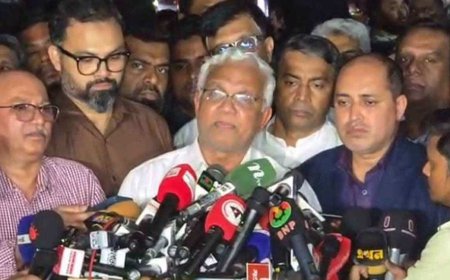Jamaat supports the commission's proposal to decentralize lower judiciary
Jamaat supports the commission's proposal to decentralize lower judiciary.

Bangladesh Jamaat-e-Islami on Monday voiced support for the National Consensus Commission's proposal to decentralise the lower judiciary and expand its presence to the upazila level, aiming to make justice more accessible to the general public.
Speaking to reporters during an intermission on the tenth day of the Commission’s second round of dialogues with political parties at the Foreign Service Academy in Dhaka, Jamaat’s Assistant Secretary General Hamidur Rahman Azad said the party endorsed the proposal, according to UNB.
“Jamaat has agreed to the Commission’s proposal to decentralise the lower judiciary from the district to the upazila level. We support this move because the current interim government, the Commission, and the broader national context are all focused on responding to the public demand for change, especially with the momentum building toward 5 August,” Azad said. “Our goal is to bring justice closer to the people.”
Azad elaborated on the challenges rural residents face when seeking justice.
“People living in upazilas have to overcome major communication, economic, and logistical barriers just to reach the district-level courts. Once there, they face further psychological and financial burdens—hiring lawyers, arranging accommodation, and managing food costs,” he said.
He noted that the situation is even more difficult for those with limited financial means. “To ease public suffering and ensure better access to justice while also reducing the case backlog in higher courts, we believe courts should be established at the upazila level.”
Azad pointed out that Bangladesh has 495 upazilas and that some already have judicial benches under constitutional provisions. “We proposed that all upazilas be gradually brought under the court system, and that existing benches be converted into permanent courts.”
Addressing concerns about potential corruption due to decentralisation, Azad acknowledged that issues such as broker syndicates and manipulation within the judiciary were discussed.
“But we must not cut off the head to treat a headache. Corruption also exists at the district level—just recall reports of a verdict issued with a forged High Court judge’s signature. The solution lies in raising public awareness, promoting moral values, and ensuring better education to curb such practices,” he said.
Azad added that the discussion also covered village courts. “The current village court system has its limitations. For example, it can impose a maximum fine of only Tk 75,000—we suggested increasing this limit.”
He also noted a shortage of skilled personnel to mediate disputes. With proper training and increased authority, these individuals could help resolve many issues at the union level itself. “Strengthening village courts can be an effective way to ensure quicker, community-based dispute resolution,” he added.
What's Your Reaction?





















































































